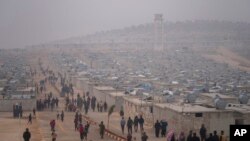U.S. efforts to ease tensions between Turkey and Kurdish fighters in northern Syria appear to be having little effect, with both sides refusing to back down despite warnings that a conflict will only benefit the Islamic State terror group.
U.S. defense and military officials say they have been in constant contact with Turkey, a NATO ally, and with the Kurdish-led Syrian Democratic Forces (SDF), a key partner in the fight against IS, so far to no avail.
"We have not seen signs of de-escalation," a spokesperson for the U.S.-led coalition to defeat IS told VOA via email Tuesday, repeating the call for "immediate de-escalation on all sides."
"We continue to oppose any military action that destabilizes the region and threatens the safety of the civilian population as well as disrupts our ongoing operations to defeat ISIS," the spokesperson added, using another acronym for the terror group.
Despite the repeated pleas, both Turkey and the SDF indicated Tuesday they are bracing for the conflict to grow, with Turkish officials adamant that the SDF be seen not as an ally in the war on terror but as an extension for the Kurdistan Workers' Party (PKK), a Turkey-based terror group.
"Our determination to eliminate this threat against our national security will continue unabated," said Turkish embassy officials in Washington, communicating on the condition of anonymity.
"We are guided by the ultimate goal of ensuring the protection of the Turkish borders and striking at the root of terrorism," the Turkish officials told VOA, adding, "Terrorist shelters, hideouts, fortifications, their so-called HQs [headquarters] and training centers constitute legitimate targets."
But the U.S. has been hesitant to abandon the SDF, crediting the mainly Kurdish force with helping to crush the IS self-declared caliphate in Syria in 2019.
Already, Washington's inability to broker a lasting understanding between the SDF and Turkey has put some of the 900 U.S. troops in Syria, part of an ongoing counter-IS mission, in harm's way when a Turkish airstrike hit within 300 meters of U.S. personnel.
And for its part, the SDF is warning that the situation on the ground is about to get worse.
"Their [Turkey's] preparations are in full swing for an imminent ground offensive," SDF Commander Mazloum Abdi said Tuesday in a virtual forum hosted by Columbia University.
Turkish proxy forces in Syria "are now fully prepared," he said, speaking through an interpreter. "The Turkish armed forces have also been amassing a huge number of forces and equipment on the border, too."
Turkey launched what it calls Operation Claw-Sword with a series of airstrikes against Kurdish targets in Syria and Iraq earlier this month, describing it as retaliation for a November 13 bombing in Istanbul that killed eight people and injured dozens more.
The SDF has denied any connection to the terror attack, arguing that suspects currently in Turkish custody have connections to IS.
Abdi has also argued that IS is hoping to reap the rewards of renewed Turkish-Kurdish hostilities, pointing Tuesday to new intelligence estimates.
"ISIS is actively preparing to break out many prisoners and are waiting for a Turkish offensive," he said. "They're expecting a ground offensive and will carry out their own planning if and when the ground offensive takes place."
U.S. officials, likewise, have voiced concern that IS cells in northeastern Syria are benefiting.
The U.S.-led coalition confirmed Tuesday that anti-IS missions are no longer a priority for the SDF, and in Washington, the Pentagon said the number of patrols aimed at hunting down the terror group's remnants is shrinking.
"They [the SDF] have reduced the number of patrols that they're doing, and so that therefore necessitates us to reduce the patrols," Pentagon press secretary Brigadier General Patrick Ryder told reporters.
"Continued conflict, especially a ground invasion [by Turkey], would severely jeopardize the hard-fought gains that the world has achieved against ISIS," he said.
On Tuesday, Turkey pushed back against such charges, saying such concerns "cannot be more detached from reality."
"The fact is, Daesh remains a threat above all to the neighboring countries due to the wrongdoings and ill-advised strategies of those who make these kinds of statements," Turkey’s ambassador to the United Nations, Feridun Sinirlioglu, told the Security Council, using the Arabic acronym for IS.
"We have on countless occasions warned against the mistake of subcontracting the fight against Daesh to another terrorist organization, namely the so-called Syrian Democratic Forces, which in reality is nothing but the PKK," he added.
In a further effort to reduce tensions, the Pentagon said it expected Defense Secretary Lloyd Austin to speak soon with his Turkish counterpart.
SDF officials hope, this time, the message to Ankara will be more forceful.
"The U.S. position should be stronger," Abdi told VOA Kurdish in an interview Monday, referring to a 2019 tweet from then-candidate and now U.S. President Joe Biden, which described former President Donald Trump's support at the time for a Turkish invasion of Syria "a betrayal."
"I recently sent a letter to President Biden and reminded him of these things," Abdi said. "President Biden should keep the promises he made in the past. We hope he will keep them now."
Zana Omer of VOA’s Kurdish Service and VOA United Nations correspondent Margaret Besheer contributed to this report.






